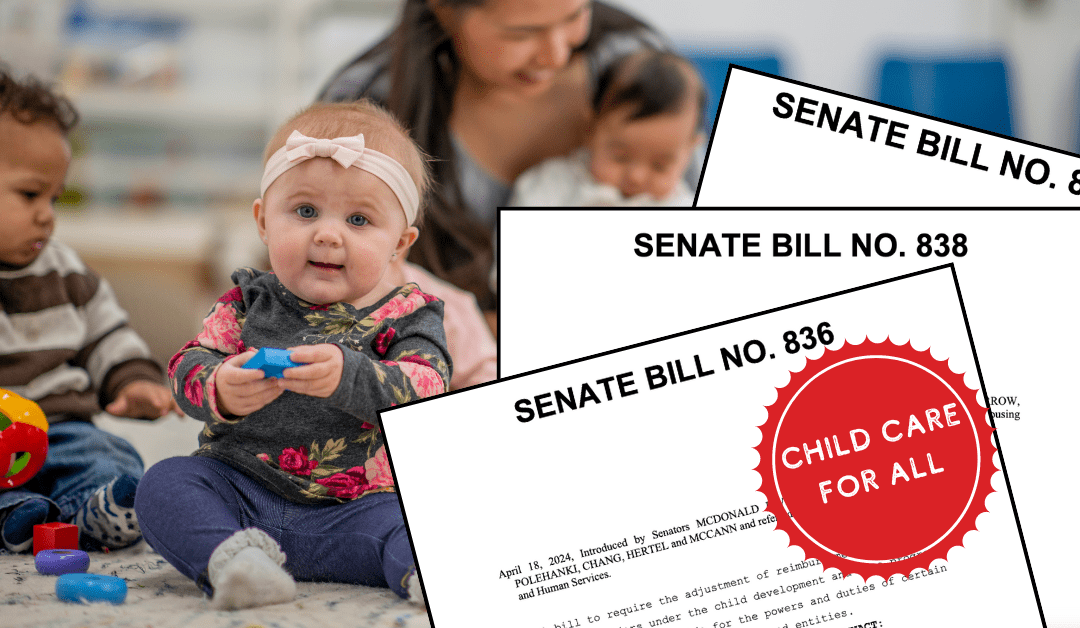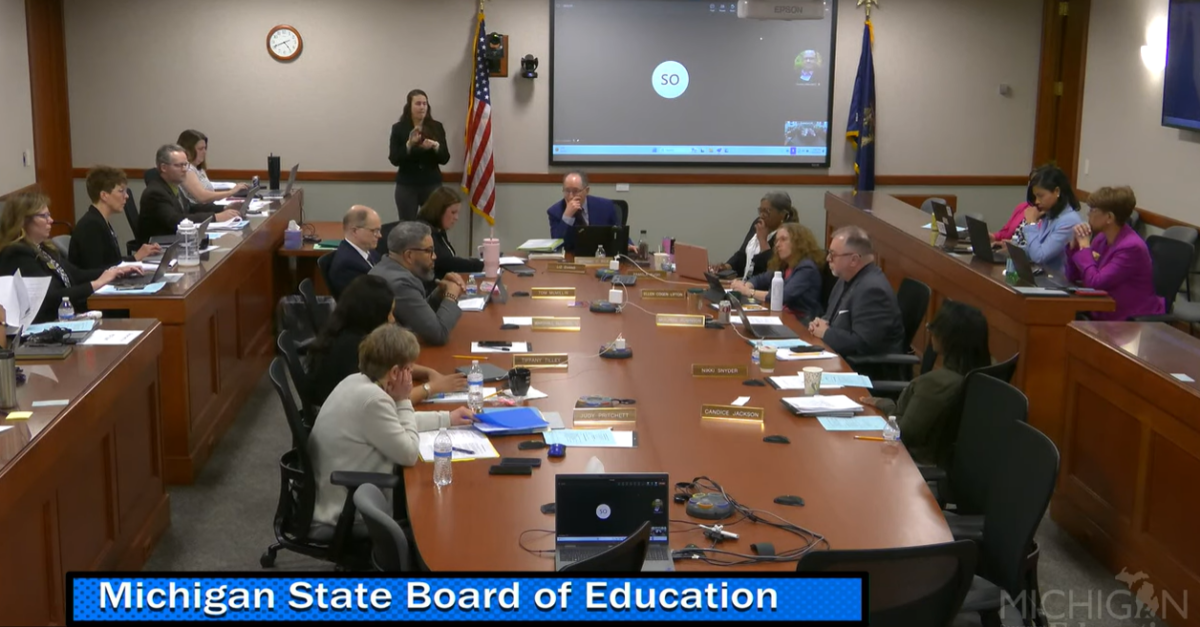
BY KATIE O’BRIEN KELLEY, MICHIGAN ADVANCE
MICHIGAN—Speakers highlighted the impact of the student loan repayment program on Michigan teachers at a Wednesday Senate Appropriations Pre K-12 Subcommittee meeting.
Providing additional funding to the “opportunity index” to help underserved students also was discussed as lawmakers craft the Fiscal Year (FY) 2025 budget. Democratic Gov. Gretchen Whitmer in February presented her $80.7 billion budget plan, including a School Aid budget totaling $19 billion, for the fiscal year starting Oct. 1.
Caitlin Donnelly, a math teacher at Washtenaw International High School and Middle Academy, testified during the hearing about why the student loan repayment program would make a difference to current and future teachers in the state.
“I’m testifying here today because this additional funding for all Michigan public educators in terms of these loan repayments would make choosing to be a public educator a lot more of a logical decision,” Donnelly said. “It would also make staying a public educator a much easier decision.”
She said the rate of teachers making it past five years is “dwindling.”
“The majority of our teachers, including many of my friends and former colleagues, don’t make it as far as I have, and that can simply not continue,” she said.
Trey Baughman, a third grade teacher at Maybury Elementary, said that the student loan repayment program wouldn’t only affect him and other teachers, but it would be impactful to the students they serve. He said that if the program were to be enacted, he would be able to put more money toward buying a house and businesses in the community.
“Reducing student debt certainly goes a long way to reducing one of the biggest stressors that many teachers in my building and my district face,” Baughman said. “And that leads to teachers who feel more focused and present in what matters the most, which is providing quality instruction everyday, closing opportunity gaps and trying to be the best educators we can be.”
State Sen. Kristen McDonald Rivet (D-Bay City) mentioned the federal programs that provide student loan forgiveness, such as the Public Service Loan Forgiveness (PSLF) Program. She asked Donnelly and Baughman why these programs aren’t enough and why people are in need of additional support at the state level.
Baughman said that these federal programs are “a nightmare.”
The PSLF Program forgives the remaining balance on borrowers’ direct loans after they’ve made the equivalent of 120 qualifying monthly payments under an accepted repayment plan and while working full-time for an eligible employer.
“These programs certainly are there, but the barriers to reach them — 10 years or 120 qualifying payments — is a long time of service,” Baughman said. “People look to make life decisions before they’ve done jobs for 10 years.”
Donnelly said the “instability in the teaching world” is another reason why additional support is needed. She said that during her first year of teaching, she was laid off within three months of being hired.
“Even if that is the step you do — these 120 qualifying payments, you follow this through — it’s hard currently in the state of Michigan,” Donnelly said. “Especially since things are generally unstable in the market to even keep that job for 10 years, even if you really, really want to.”
Sen. Thomas Albert (R-Lowell) asked what will happen for people who have already repaid their student loans.
“I do think that investing into opportunities to attract folks to the profession and knowing that the state of Michigan is investing back into those educational opportunities is a positive step forward,” Sen. Darrin Camilleri (D-Brownstown Twp.) said. “It’s not a perfect answer and I will own that and recognize that because, you know, it’s not going to be perfect for people who have already done their service and paid off some of their student loans. But doing nothing is also not a good option either.”
McDonald Rivet said that it’s important to recognize that the cost of college tuition today is very different than it was a decade ago.
“A five-year degree with room and board at a state school in Michigan is $125,000,” Rivet said. “For them to go into a starting salary in the mid-30s to high-30s is an impossible ask.”
Jeff Cobb, director of government affairs for The Education Trust-Midwest, discussed the “opportunity index” that the Michigan Partnership for Equity and Opportunity created to help target and provide funding to schools with underserved students, including students with disabilities, English learners and students with low income backgrounds.
In June 2023, Michigan joined the nation’s first 10 states with state school funding formulas that include an index for concentrations of poverty, according to the MPEO website.
Cobb said that last year was a “great start” to providing underserved students in Michigan, but that there’s still more to be done.
He proposed investing an additional $500 million this year in the opportunity index to “set us on the path to fully funding the current opportunity index weights in five years.”
He said that the opportunity index will expand opportunity and access to public schools for all children in the state and prioritize resources for districts serving the highest concentration of students from low income backgrounds.
“We need you. We need you to fully fund the opportunity index in the manner that’s been put before you,” said Jametta Lilly, CEO of the Detroit Parent Network. “We know that it’s critical because what you’re going to do is you’re going to enable the capacity of school districts, of the very teachers that testified to us.”
Voces Executive Director Jose Orozco said Michigan is currently underfunding English learners by at least $486 million annually.
He said the 50% increase in funding for English learners last year was “the first significant increase for these students in decades.”
Orozco proposed funding an additional $57 million annually over the next five years for these students. He said a key step towards reaching this five year goal would be to double the amount of funding in this year’s budget from $40 million to at least $80 million.
“We have an opportunity to invest in the families moving here so Michigan can be seen as a welcoming state that offers a great public education for all students,” he said. “Research recommends English learners receive at least twice the amount of funding as native English speakers to provide them with the additional instructional support necessary for language acquisition.”
READ MORE: Michigan lawmakers pass bills to help students overcome dyslexia
This coverage was republished from Michigan Advance pursuant to a Creative Commons license.
Politics

SEIU workers ahead of NFL Draft: We are ‘the backbone of Detroit’
BY KEN COLEMAN, MICHIGAN ADVANCE MICHIGAN—A day ahead of the National Football League annual draft being held in Detroit, Service Employees...

Investigator says Trump, allies were uncharged co-conspirators in plot to overturn Michigan election
DETROIT—A state investigator testified Wednesday that he considers former President Donald Trump and his White House chief of staff to be uncharged...

Michigan Dems introduce ‘Child Care for All’ legislation to lower costs for families
Lawmakers say Michigan is facing a ‘child care crisis.’ But a series of bills introduced this month would help to make child care (much) more...
Local News

The 10 best burger joints in and around Lansing
Warning: Do not read this list if you missed lunch or you will find yourself hopping in the car to drive to these best burger joints in Lansing. ...

10 unique wedding venues in Michigan to suit every kind of couple
From a distillery in Detroit to a summer camp, we’ve rounded up some of Michigan’s most unique wedding venues. Of all the elements you need to...




